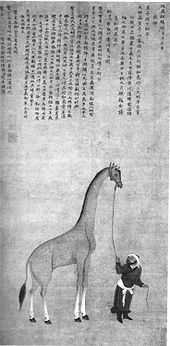China–Somalia relations
 | |
China |
Somalia |
|---|---|
China–Somalia relations refers to the bilateral relations between China and Somalia.
History

Somalia and China have a long relations in terms of trade, military, culture and language.[1] The Somalis traded with the Ancient Shang and Zhou dynasties of China.
Middle Ages
Relations between Somalia and China long predate the Middle Ages. Through trade, the peoples of both areas established good relations. Giraffes, zebras and incense were exported to the Ming Empire of China, which established Somali merchants as leaders in the commerce between the Asia and the Horn of Africa,[2] and in the process influenced the Chinese language with the Somali language and vice versa. The Chinese exported celadon wares, spices and muskets in return for horses, exotic animals and ivory. The prominent Hui-Chinese explorer, mariner, diplomat and fleet admiral, Zheng He, arrived in his fourth and fifth voyage to the Somali cities of Mogadishu, Zeila, Merca and Berbera.[3] Sa'id of Mogadishu a Somali explorer travelled to China in the 14th century, when China was ruled by the Yuan Dynasty, and noted the trading communities of the Chinese ports and cities.
Cold war era
Official relations between the Somali and Chinese governments were established on 14 December 1960.[4] Somalia and China later signed their first official trade agreement in June 1963.[5]
During the Cold War period, the Somali government maintained active relations with its Chinese counterpart. The Somali authorities campaigned for an end to China's diplomatic isolation and supported instead its entry into the United Nations.[6]
The Sino-Soviet split had a large influence on China's relations with countries in Africa. As early as 1964, Somalia was described as the first major center of Sino-Soviet rivalry on the continent.[7] When the Somali side expelled Soviet representatives in late 1977, China agreed to take over many of the development projects started by them.[8]
Present-day
In January 1991, the Chinese embassy in Mogadishu closed down operations due to the start of the civil war in Somalia.[9] Despite the departure of most Chinese officials, the two countries maintained a small trading relationship in the ensuing years. Total trade volume in 2002 was US$3.39 million, with Somalia exporting US$1.56 million of goods to China and importing $1.83 million.[4]
From 2000 to 2011, approximately seven Chinese development projects were launched in Somalia.[10] These initiatives included $6 million in economic assistance,[11] donation of anti-malaria drugs,[12] and $3 million in debt relief.[13]
In July 2007, the Chinese state-owned oil company CNOOC also signed an oil exploration agreement with the Somali government over the north-central Mudug province, situated in the autonomous Puntland region.[14]
Following the establishment of the Federal Government of Somalia in mid-2012, the Chinese authorities reaffirmed their support for the Somali government and called on the international community to strengthen its commitment to the Somali peace process. China's Permanent Representative to the UN, Li Baodong, also emphasized his administration's support for the Somali federal government's stabilization plan, including the latter's efforts at "implementing an interim Constitution, carrying out its six-point plan, strengthening institutional capacity, exercising government functions and extending effective authority over all its national territory."[15]
In August 2013, follow a meeting with Chinese Vice Premier Wang Yang, Somalia's Foreign Minister Fowziya Yusuf Haji Adan announced that the Somali authorities looked forward to cooperation with the Chinese government in the energy, infrastructure, national security and agriculture sectors, among others. Wang also praised the traditional friendship between both nations and re-affirmed China's commitment to the Somali peace process.[16] In September 2013, both governments signed an official cooperation agreement in Mogadishu as part of a five year national recovery plan in Somalia. The pact will see the Chinese authorities reconstruct several major infrastructural landmarks in the Somalian capital and elsewhere, including the National Theatre, a hospital, and the Mogadishu Stadium, as well as the road between Galkayo and Burao in northern Somalia. Additionally, Chinese ambassador Liu Guangyoun indicated that China would re-open its embassy in Mogadishu on land that had been donated for the purpose by the Somali government.[17]
See also
References
- ↑ Colour, confusion and concessions: the history of the Chinese in South Africa, 2005, Melanie Yap,Dianne Leong Man, page 3
- ↑ East Africa and its Invaders pg.37
- ↑ Zheng He's voyages down the western seas - Page 42, 福建省新闻办公室
- ↑ 4.0 4.1 "China and Somalia". Ministry of Foreign Affairs of the People's Republic of China. 2003-10-12. Retrieved 2007-06-11.
- ↑ "Somalia to Trade With China". The New York Times. 1963-06-09. Retrieved 2007-11-06.
- ↑ Ssekandi, Ronald (30 January 2013). "Somali FM hails Somalia-China relations". Xinhua. Retrieved 2 July 2013.
- ↑ Schwartz, Harry (1964-09-06). "Communists Competing in Africa". The New York Times. Retrieved 2007-11-06.
- ↑ "Chinese to Increase Aid to Somalia". The Washington Post. 1987-04-21. Retrieved 2007-11-06.
- ↑ Chinese Foreign Ministry (October 10, 2006). "FOCAC Beijing Summit: Somali".
- ↑ Austin Strange, Bradley C. Parks, Michael J. Tierney, Andreas Fuchs, Axel Dreher, and Vijaya Ramachandran. 2013. China’s Development Finance to Africa: A Media-Based Approach to Data Collection. CGD Working Paper 323. Washington DC: Center for Global Development.http://china.aiddata.org
- ↑ Strange, Parks, Tierney, Fuchs, Dreher, and Ramachandran, China’s Development Finance to Africa: A Media-Based Approach to Data Collection.http://aiddatachina.org/projects/2285
- ↑ Strange, Parks, Tierney, Fuchs, Dreher, and Ramachandran, China’s Development Finance to Africa: A Media-Based Approach to Data Collection.http://aiddatachina.org/projects/28502
- ↑ Strange, Parks, Tierney, Fuchs, Dreher, and Ramachandran, China’s Development Finance to Africa: A Media-Based Approach to Data Collection.http://aiddatachina.org/projects/2284
- ↑ Jopson, Barney (2007-07-13). "Somalia oil deal for China". Financial Times. Retrieved 2007-11-06.
- ↑ "China calls on international community to continue advancing Somalia peace process". Xinhua. 7 June 2013. Retrieved 2 July 2013.
- ↑ "Somalia: Chinese Vice Premier Meets Somali Counterpart". Shabelle Media Network. 27 August 2013. Retrieved 11 September 2013.
- ↑ "Somalia: Gov't, China Officially Sign Cooperation Agreement". Dalsan Radio. 9 September 2013. Retrieved 11 September 2013.
| |||||||||||||||||||||||
| ||||||||||||||||||||||

